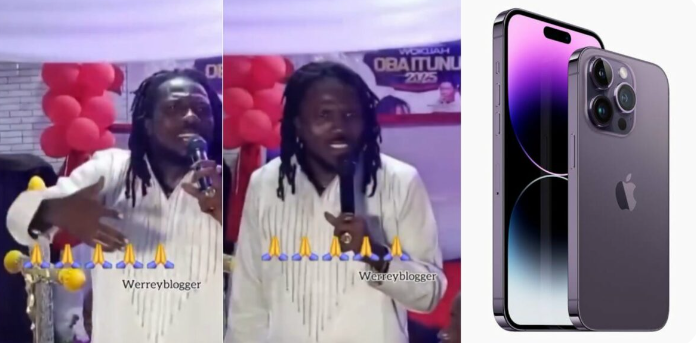
Pastor Cries Out as Church Member Allegedly Steals His iPhone 14 Pro Max During Service

The Nigerian social media space has once again been set ablaze after a shocking video surfaced online showing a pastor lamenting bitterly inside his church, accusing one of his members of stealing his precious iPhone 14 Pro Max. The viral clip, which has been widely shared across X (formerly Twitter), Instagram, and Facebook, captures the raw moment the man of God paused his sermon to express deep pain over the disappearance of his expensive device. According to him, the phone, which had been in his possession before the service, mysteriously vanished while he was in the middle of ministering to his congregation, leaving him visibly agitated.
In the video, the pastor could be seen addressing his members with a stern face as he appealed to whoever took the phone to quietly return it before matters escalate beyond the walls of the church. He stated in clear terms that while he was willing to forgive if the phone was returned immediately, he would not hesitate to involve security agencies if the thief failed to do so. He specifically mentioned the Department of State Services (DSS), vowing that once the device is tracked and the culprit identified, he would do everything in his power to ensure the individual is prosecuted and sent to jail. His statement, “Whatever I have I will use to put that person in prison,” has since become a viral quote circulating online as Nigerians debate the drama that unfolded in his church.
The incident, which many describe as both comical and worrisome, has stirred a heated conversation about morality within the church and the extent to which some members may go, even in sacred spaces, to commit acts of theft. For many, the irony of a phone being stolen from a man of God who preaches against sin every Sunday is not lost. Some netizens have pointed out the contradiction of a pastor, often believed to have spiritual gifts and prophetic vision, being unable to detect the person responsible for the theft right under his own roof. This line of thought has fueled hilarious and mocking reactions online, as critics and skeptics alike question how a clergyman capable of “seeing visions” and “discerning spirits” did not foresee his phone being taken.
One X user, @Jayboi0247, jokingly remarked, “Em don achieve pastor phone. Why holy spirit no tell am who tiff am.” Another, @Nofacenocase181, went even further, writing, “Werey wey dey see vision, dey see people so called problems, who dey do dem & even dey claim say dem dey see future o. No fit find him phone? And mumu go still dey go Him church. Na wa o.” Such comments have been widely circulated, leaving the pastor in the center of ridicule and the story one of the top trending topics on Nigerian social media.
But beyond the jokes, the situation raises serious concerns about trust and security within places of worship. For centuries, churches have been regarded as sanctuaries of peace, morality, and honesty, yet incidents like this highlight the growing challenge of crime even in the most unexpected places. For many observers, the brazen act of stealing from a pastor during a church service symbolizes the moral decay in society and the desperation of individuals who have lost both conscience and fear of God. Some argue that poverty and economic hardship may be pushing people to such extremes, while others insist that theft in any form, especially in a house of God, can never be justified.
The pastor’s reaction has also drawn attention, particularly his decision to threaten the use of state security services like the DSS. For some, this was a necessary step to deter such acts in the future and to emphasize that sacred spaces are not exempt from the rule of law. For others, however, the threat seemed excessive, considering the DSS is generally tasked with handling issues of national security and not personal theft cases. Critics argue that involving the DSS over a phone, no matter how expensive, sends the wrong message about the priorities of religious leaders and how far they are willing to go when their own personal property is at stake.
Meanwhile, the public’s fascination with the case is also tied to the specific phone in question: an iPhone 14 Pro Max. In Nigeria, the iPhone has long been associated with luxury, wealth, and social status. Owning the latest model is often seen as a sign of success, and the hefty price tag attached to such devices makes them highly coveted items. Thus, the fact that the pastor’s missing phone was not just any device but a high-end Apple product has added spice to the story. Many online users have sarcastically suggested that perhaps the pastor’s device was too much of a temptation for someone in his congregation to resist, especially in a country where the average person struggles with economic realities.
As the debate rages on, some have turned the incident into a broader commentary on the lifestyles of modern pastors. Questions have been raised about why men of God need to flaunt expensive gadgets when many of their members are struggling to feed. Critics suggest that the presence of such luxury items in church settings not only creates envy but also exposes pastors to risks of theft. Others, however, defend the clergy, arguing that pastors, like anyone else, have the right to enjoy the fruits of their labor and to own nice things. For them, the issue is not the pastor’s possession of the iPhone but the audacity of a member to steal it during a service.
While the story continues to trend, there is still no official update on whether the phone has been recovered or whether the alleged culprit has been caught. The pastor’s passionate outburst and threat to jail whoever is responsible has, however, ensured that the incident will not be forgotten anytime soon. Nigerians online have already coined catchphrases around the matter, with some joking that the stolen iPhone has now become “the most anointed phone in Nigeria” due to the spiritual drama surrounding its disappearance. Others simply see it as another reminder that “not everything holy inside church is safe,” a phrase that has been repeated in memes and skits mocking the situation.
At the heart of this bizarre incident lies a mix of comedy, tragedy, and irony. A pastor’s anguish, a congregation’s silence, a stolen luxury phone, and a society quick to turn real-life drama into viral entertainment. Whether or not the phone is ever recovered, this story has already cemented itself as one of the most talked-about viral gists of 2025. It speaks volumes about the state of modern Nigerian society, where sacred and secular collide in unpredictable ways, and where even in the house of God, nothing—apparently not even an iPhone 14 Pro Max—is truly safe.


